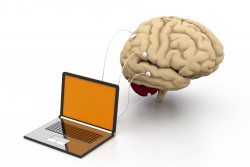Anxiety
Can Neurofeedback Help Anxiety?
Anxiety is usually a person’s response to stress, which can come from psychological, physical, dietary, or environmental sources, like loud noises. Once a person’s brain gets locked into a pattern of anxiety, it can be difficult to break. For anxiety sufferers, learning how to modulate or turn off chronic stress responses is life changing.
Neurofeedback provides physiological assistance and helps people learn to change their responses to stress. With brain training, they can develop the skills they need to reduce or eliminate anxiety in their lives.
 How Do You Know It’s Anxiety?
How Do You Know It’s Anxiety?
Anxiety manifests in many ways. Symptoms can include excessive worrying, a nagging sense of fear, restlessness, overly emotional responses, negative thinking, catastrophizing, and defensiveness. Anxiety is usually present in cases of addiction, perfectionism, being overly controlling, and behavioral issues.
Anxiety sufferers often feel overwhelmed, exhausted, and stressed out. Some can’t concentrate due to their intense internal focus. Others obsess about specific things. Anxiety is easily detected if someone appears outwardly nervous; however, many sufferers appear calm on the outside, but their brain never stops. They can’t stop thinking, and the constant internal chatter can get so bad that it interrupts their sleep and steals their quality of life. They don’t live in the present, because they constantly worry about the future or live in the past.
Brain Training Is a Solution.
Helping people learn to calm themselves is by far the most effective solution for anxiety, and gives sufferers hope as they take control of their lives.
Neurofeedback is one of the quickest and most efficient ways to teach people how to help themselves, and it’s easy to learn. Brain training been used for many years with solid, proven results. Learning this life skill decreases the need for dependence upon medications, and improves quality of life by teaching the brain to make healthier patterns on a more consistent basis so anxiety responses are avoided and a calmer brain stays more in control.
Is Neurofeedback an Alternative to Medication?
Anxiety patients are regularly prescribed medications, but prescription drugs can’t teach you how to quiet your mind. Generally, only one or more areas in the brain are causing anxiety, and brain training identifies and targets those problematic areas of the brain. Medications tend to affect the entire brain, which is why some medications may cause people to feel tired or sluggish.
- Medications only work when you are taking them, so patients become dependent on them to decrease anxiety.
- When you take a medication without having other tools, it’s likely the anxiety will return.
- If the anti-anxiety medication is addictive, which many are, improper weaning can produce more stress and withdrawal.
- If medications stops working or side effects occur, physicians often switch to a different one. This can cause agitation and confusion while a client gets used to the latest drug.
Neurofeedback has proven to help reduce anxiety long term and allow people to wean off medication with their doctor’s supervision. As the brain learns to decrease anxiety and remain more calm, often less medication is needed.
Why Haven’t I Heard About Brain Training?
There is currently a resurgence in neurofeedback usage, particularly for anxiety, because it is highly effective. In the 1980’s, biofeedback was popular for anxiety, and stress reduction and was used by many professionals. The subsequent decrease in popularity was not due to poor results. It was caused by a decision by insurances companies to cut the rate of reimbursement for this treatment by approximately 75%!
Over the years, technology and knowledge of the brain have made incredible advances. Researchers and practitioners continually apply this knowledge and hone neurofeedback technology and protocols into increasingly more effective brain training tools.
How Does Neurofeedback Reduce Anxiety?
 As you brain train, you watch your brainwaves live on an EEG computer monitor. As you learn to reduce anxiety and increase calm, you can watch your brainwaves change. With neurofeedback, you learn to recreate that state and moderate your response to stress so that anxiety is minimized and occurs less frequently. With sufficient training, your brain learns to maintain healthier patterns on its own more consistently. It’s like exercise for the brain.
As you brain train, you watch your brainwaves live on an EEG computer monitor. As you learn to reduce anxiety and increase calm, you can watch your brainwaves change. With neurofeedback, you learn to recreate that state and moderate your response to stress so that anxiety is minimized and occurs less frequently. With sufficient training, your brain learns to maintain healthier patterns on its own more consistently. It’s like exercise for the brain.
Neurofeedback facilitates awareness, provides reinforcement, and allows one to monitor their brain training practice during their neurofeedback sessions. As the brain learns, clients can begin decreasing the frequency of their brain training sessions. Most people can stop training once they reach their goal, and the training is holding. A small number of sufferers with persistent, extremely resistant or complex issues require occasional “tune ups” or a greatly-reduced, maintenance, brain training schedule.
To learn more about how neurofeedback can help with anxiety or panic attacks, please visit our Neurofeedback Provider List to see if we have a clinician listed near you.

